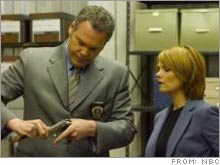 |
| The top-rated TV show, "CSI," will soon be available on demand for some Comcast customers. |
|
 |
| You'll be able to watch "Law & Order: Criminal Intent" on demand, but not the original "Law & Order" under the deal between DirecTV and NBC. |
|
|
|
| More about media and the Web
|
|
|
|
|
|
|
NEW YORK (CNN/Money) -
The old dogs of television, the broadcast networks, have learned some new and potentially lucrative tricks.
General Electric (Research)'s NBC and Viacom (Research)'s CBS have announced deals with two of the largest pay-television providers that will let viewers watch many of their primetime shows on-demand for 99 cents a show.
NBC Universal, which includes NBC and a number of cable networks, will make some of its hit shows available, commercial-free, for 99 cents through the video on-demand service of the nation's largest satellite-television operator, DirecTV (Research).
CBS is partnering with Comcast (Research), the nation's largest cable television operator, to make a number of its programs available to some Comcast customers in a video on-demand format. It will also charge 99 cents to watch a version of such shows as "CSI," "Survivor" and "The Amazing Race," for a week after their original airing, although they will include commercials.
The announcements follow the recent deal between ABC and Apple (Research)'s iTunes to offer versions of some of the hit ABC shows like "Desperate Housewives" and "Lost" on the video iPod or computers.
All networks are expected to strike deals to make their shows available outside traditional channels in the coming years.
For the networks, these deals could be the first real opportunity to move away from almost complete dependency on advertising and toward subscriber revenue that has created their greatest competition over the last 30 years -- cable television.
But certain difficulties will make these early offerings far more limited for customers than they appear at first, and competing technologies, such as digital video recorders and high-speed Internet video downloads, make the success of these new offerings far from certain.
Even some of the businesses that stand to gain the most face new challenges from a much less certain world.
Here's an early handicapping of what the deals mean for the various parties in the world of entertainment.
Viewers
These offerings are going to come far more slowly and be more confusing than the initial reports would have you believe.
Even if you're a Comcast digital customer, you won't get the chance to watch "CSI" on-demand if you live outside of the major metropolitan areas where CBS also owns the affiliate. And many of NBC's most popular shows, including "Law & Order," "The West Wing" and "ER" won't be immediately available because NBC does not own the video on-demand rights to those shows.
These types of restrictions are likely to change through further negotiation over time. But some limitations may linger the same way some popular movies weren't available on video or DVD for a number of years. Furthermore, sports, long a staple of network programming, is unlikely to move to on-demand status until the networks become convinced the demand is there to justify the higher rights fees they would have to pay.
Broadcast networks
Access to subscriber revenue is an important source of cash for networks finding it tougher to squeeze more money from advertisers as viewers find more ways to avoid commercials. But experts say it's unlikely to become the tail that wags the dog anytime soon.
"Three years ago, when Apple released iTunes, at that point digital music represented zero percent of music sales. Now it's about 3 to 4 percent of sales," said Forrester Research analyst Josh Bernoff. "That's not an overwhelming shift. On the other hand, it's got high growth and it's saving the industry."
Bernoff estimates that five years from now it will be safe to assume that 10 to 15 percent of network revenue will come from alternative distribution, such as on-demand and Internet downloads to computers and portable devices, as well as from cell phone viewership. Media and advertising analyst Jack Myers estimates that those sources of revenue could reach 30 percent within seven to 10 years.
Still, it won't all be found money for the networks, which in the future will be paying more to actors, studios and others involved in the production of the shows to gain the on-demand rights. And competition from other networks will likely keep the per-program charge in check.
Perhaps more important in the long-term, the new distribution channels for broadcast shows could allow the networks to offer racier content to compete with cable at a time that the Federal Communications Commission has cracked down on free over-the-air content.
Bernoff could see a time when ABC offers a free on-demand version of "Desperate Housewives," which includes commercials that viewers cannot scan past, a 99 cent version either without commercials or with a fast-forward option, and a $2.99 version with content too hot for the airways.
An ABC spokesman wasn't available for comment on that hypothetical, but CBS spokesman Dana McClintock said anything is possible looking into the future.
"That type of offering has been discussed with DVDs. I would tell you anything and everything is possible," he said.
But the networks won't be the only ones offering this kind of video on-demand to tap new sources of revenue and new content freedom. Cable shows will be able to do the same, giving the networks even more competition.
The networks have been nervous for years about digital video recorders, on which viewers can set their own schedule.
"It's a major step in collapsing the traditional 'You can only watch it when we tell you can watch it" model. It's an acknowledgement that viewers are in control," said Myers.
Advertisers
Advertisers appear to have the most to lose through on-demand broadcasts, as on-demand gives viewers even more opportunities to skip television commercials.
But on-demand isn't required for viewers to skip commercials; all it takes is a remote control or working bathroom in the house. At least with on-demand programming, the advertisers can get harder data on what percentage of viewers are actually watching their shows, and perhaps get far more accurate information about the demographics of those watching their spots. That can lead to more efficient ad buys in the future.
But surprisingly enough, almost half the customers who watch programs using a digital video recorder, such as TiVo, continue to watch the commercials on the shows they chose to record. And as Bernoff suggested, on-demand might offer viewers a free or cheaper download if they agree to watch a version that doesn't let them skip the commercials. The experts say it's too soon to say that advertisers will be the big losers long-term.
"With branded entertainment, it's inevitable that advertising will find its way back into the model," said Myers.
Cable and satellite companies
The cable and satellite television operators are clearly positioned to be winners, because they can offer content that could draw customers to sign up for their more expensive digital offerings.
But it's not clear what kind of demand there will be for this kind of programming at this price. Page Thompson, head of Comcast On Demand, concedes that 95 percent of on-demand viewers are now viewing free content.
"The free content was essential to build the platform we have today," he said. "But this is the type of high-quality content that we think is one of the very few examples capable of demanding a fee."
The growing use of digital video recorders, such as TiVo (Research) or the cable companies' own offerings, could also limit the willingness of customers to pay even a modest on-demand fee. And the more widely available on-demand could also cause problems for DVR services. About 10 million homes have DVRs, compared with about 25 million that can watch on-demand shows on cable today.
But Thompson said, "Historically we've always seen DVRs and on-demand as complementary." He said those are the customers who want to watch shows on their own time.
Other potential losers
Independently owned network affiliates stand to lose a lot if they can't reach agreements with the networks on deals to make up for lost viewers of their broadcasts and their own commercials. Alan Frank, chairman of the Network Affiliated Stations Alliance, which represents 600 such stations, said it's too soon to say if the on-demand offerings turn out to be good or bad for his members.
"We're always ready to work with the networks," he said. "We understand the business is changing. It's the details we have to work out to see what it means."
Some cable networks could also be losers in the long-term, said Bernoff, as viewers might chose to watch an on-demand version of their favorite show rather than a rerun on cable from past seasons.
"If you're TNT or TBS, where syndication is the mainstream of your business, you could be hurt by this," he said. A spokeswoman for Turner Broadcasting, which owns those networks, would say only that the current deals will not affect it. Turner, like CNN/Money, is a unit of Time Warner.
The CBS and NBC agreements could also be bad news for Apple, as the deals are a "strong indications that Apple will not be able to easily replicate its digital audio dominance in the nascent market for digital video," according to a note from Goldman Sachs analyst David Bailey.

|